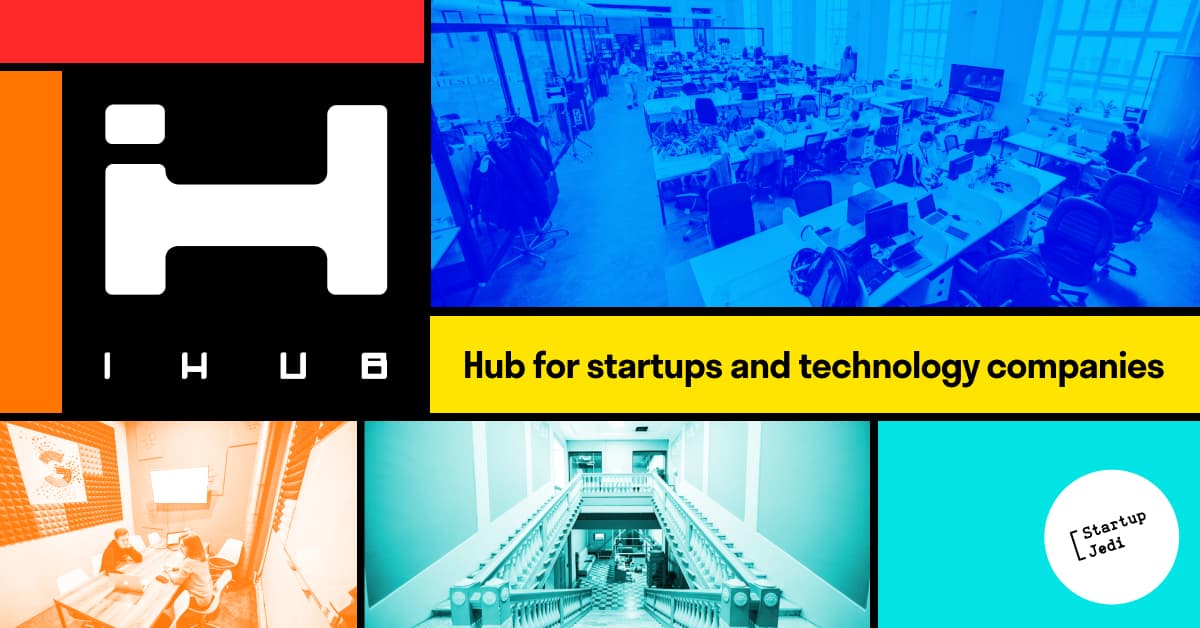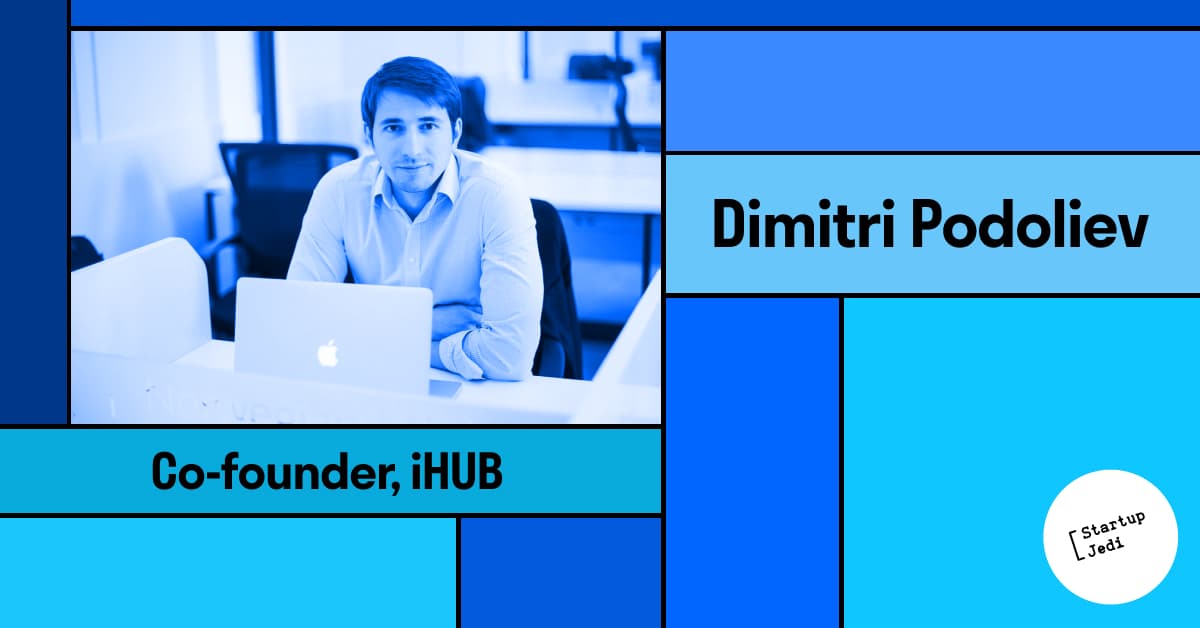
Startup Jedi
We talk to startups and investors, you get the value.
We found out from iHub co-founder Dimitri Podoliev how Ukrainian business has changed since the Maidan, why Kyiv is getting closer to European IT capitals, and how to get a grant from the Ukrainian Startup Fund.

Startup Jedi
We talk to startups and investors, you get the value.
iHUB — a network of startup hubs, which combines coworking, acceleration programs and event production in Kyiv, Lviv, Vinnytsia and Chisinau, was founded in 2012. iHub also develops its own startups ― for instance, in April 2020, the Mindly psychologist recruitment service was announced.
Co-founder of the project Dimitri Podoliev is an ex-investment banker who had been working for almost six years at the British investment fund Alpcot Capital Management and left there in the post of the business manager in Ukraine.
...
— Today iHub is a whole range of projects for the startups development. And what was the main idea of iHub at the beginning?
— iHub was founded more than 8 years ago. At that time, I had already been living in Ukraine for five years and dreamed of creating a physical location and a community of people, united by a common interest in the growth of new technologies. I’m a tech geek by education, so I was at a lack of appropriate content both in communication and work.
At first, iHub was a kind of hobby for me — for fun. I wanted to spend my leisure time in the “like-minded people” circle, where I could discuss technology topics, learn from each other, as well as create common teams and possibly attract investors in the future.
— What did you do before your iHub foundation?
— I was working for an English investment fund. Our team has invested in the growing markets of Eastern Europe — particularly in Russia and Ukraine.
I left Ukraine as a 10-year-old child. I came back in 2009, when I was 23. Firstly, I lived in Finland, then went to Cambridge, then studied at MIT (Massachusetts Institute of Technology — Startup Jedi) in Boston, then began to build a career in London.
— The iHub description says that it is a Ukrainian-Norwegian project. Is that true?
— Yes, initially, my partner and I received a grant from the Norwegian government and about 4 years we were developing on these funds. Today, iHub is financially independent. Although we still have a Norwegian flag hanging at the entrance to the hub.
...

— You have lived for many years abroad, in very developed countries ― Finland, England, and the United States. Why did you return to Ukraine?
— In 2009, the investment fund in London, where I worked, decided to open an office in Kyiv. At that time, we received a lot of investments for business development in Ukraine. The new office was more convenient to manage from Ukraine, so I came back. Although I must admit that at that time I didn’t know my own country at all and didn’t understand what to expect.
— From the outside, it seems that Ukraine began to change a lot after the last Maidan in 2014. But you moved earlier. Was it difficult for you at that time?
— At that time Ukraine was already tempting for big business. During the six years of my work in the English fund, we invested $300 million into the country. Investors have always been attracted to the Ukrainian agricultural sector, oil, gas, and timber. In addition, the country is interesting as a logistics artery for international trade.
The first Maidan was, so to speak, a test one. And after the second one, Ukraine fundamentally changed. Since then, it has become a truly democratic, free country, where politicians and business play fair. Previously, Ukraine, Russia and Belarus were in the same category of countries where it is risky to start a business. Today we have reached a new level. Modern Ukraine is really a whole Europe.
— How quickly did you realize that after the events of 2014 it would be a completely different country?
— Gradually. Don’t think that after the change of power, you will wake up immediately in a new country. But if I look back now, I can see that during all this time lots of things have been done than in the years of Ukraine’s independence.
First, the government has become more open. Today it is absolutely free to write to any deputy directly on Facebook — and you will be answered. The government is really interested in how business is developing and what problems exist. The officials are assigned based on resumes, not on the friendship connections. The tax authorities have stopped “pressing” small businesses — it used to be a standard practice.
Secondly, we see a lot of IT innovations. Since 2019, the Ministry of Digital Transformation (we call it the Ministry of IT) has been operating in Ukraine, and in July 2019, the Ukrainian Startup Fund appeared ― a state fund that invests in early-stage startups.
— There are also foreign entrepreneurs among the residents of iHub. I wonder what attracts them to Ukraine?
— Yes, there are even Americans among our residents. Why is it profitable for them to build the business in our country? First, Ukraine is conveniently located, almost in the center of Europe.
Secondly, there are many educated, but inexpensive staff, for example, developers. Every year the mentality of Ukrainians is becoming closer to the European one, especially for young people. People are effective workers -and this is the best quality for the staff.
Of course, all of us still have room for improvement. But in terms of the pace of business development, Ukraine is a very attractive country. It seems to me that if everything goes on like this, then in ten years Kiev will stand on a par with such European IT capitals as London, Berlin, Stockholm…
...

— You said that iHub was originally something of a hobby, existing in parallel with real job. Is it still for fun or has it transformed into a business for you?
— Now it’s even more fun than before ― but in the sense that I’m getting more and more pleasure from the project. iHub has significantly expanded to many areas: now there are both commercial and non-commercial structures in the group of companies under the general iHub brand. Now there are about 30 people in the team, half of them are in the Kiev office.
— What exactly do we do?
— First, it’s coworking. Three of our hubs are located in Ukraine, one in Moldova (imagine there is a very active IT community!) In total, these are offices with 500 seats and 3,000 sq. m. In Kiev ― the largest coworking with 210 seats.
The second direction is event production, including outsourcing.
This year in March, we are launching two acceleration programs together with European and American accelerators ― and this is the third direction.
At the beginning of this year, iHub became the official representative of the Estonian e-Residency: we will help entrepreneurs to get a virtual residency in Estonia (virtual residency is a program launched by Estonia in 2014, which allows people who are not citizens of this country to have access to such services from Estonia as company formation, banking services, payment processing and tax payment-Startup Jedi).
The last direction is the in-house startups. For example, last year spring, we launched a project called Mindly ― an online platform for consulting with psychologists and psychotherapists for the Russian-speaking population.
— It turns out that the hub led to the creation of its own startup, doesn't it?
— Yes. We saw that in the Russian-speaking market, the niche is not saturated. We have experience in the selection of psychologists ― this is such a broad topic that it is better to tell about it separately. In the meantime, I can say that i didn’t think of psychology as a science before, and I was mistaken. Now I believe that humanity will deny Newton’s laws faster than knowledge about the human psyche. I don’t have a lot of experience in psychotherapy, but I communicate a lot with psychologists and was able to go deep into this topic.
— Coworking hubs were also opened in other cities of Ukraine ― why did they close? Some sources even mention Tbilisi?
— They closed because they weren’t profitable.
— You have a lot of activities, but many are just starting, and events in the pandemic have clearly decreased. What makes a profit then?
— Of course, it is no longer so active, but the coworking continues to work (Dmitry refused to answer the question about which direction brings the profit to the project). Many employees of resident companies take turns going to the office. Plus, we have powerful ventilation in our offices, which contributes to constant air exchange. As for the events, we began to hold them online.

— How much did the coworking attendance drop in 2020?
— It’s hard to say, because no one has monitored these numbers. But the fact that iHub is not just a coworking, real estate business, but still a hub with its own communities really helped us a lot.
— How is the selection of residents going? And how do you help them grow?
— It’s simple: you have to be relevant to the IT ecosystem. Additionally, we have a light program for aspiring startups ― iHub-labs, in which they can use coworking services just for $30 per month for one workplace. And such startups are also considered our residents.
— How many residents do you have at the moment?
— About 100+. Over 8 years of work, more than 1000 companies have gone through us.
— Which startups were among your residents?
— For example, companies such as Preply and Goat, Mobile Nurse, Cardiomo WeSoftYou, ChatBots, Helpware, NaShasi, AllSet.
— Can non-residents visit your coworking events?
— Only by the invitation of residents of the hub.
— Recently, many IT specialists from Belarus have moved to Ukraine. Can they become a part of your community?
— Yes, of course. And we will even make a discount, counting the political situation in Belarus. At the moment, we have three residents from Belarus, including Rocket DAO and the Startup Jedi editorial board.
...

— Your first acceleration program will start on March 1. What are the selection criteria and what do you plan to give to young projects?
— The selection is carried out not by us, but by the expert commission of the Ukrainian Startup Fund, as it funds this program. Not only residents of our hub can apply. The model is following: a startup is submitted to the Fund, its expert commission selects, the best projects are accelerated within 3 months ― after which they can apply for a grant of $75,000. Our goal is to grow the startup to the level that it can apply for this grant.
— On what conditions will you help startups?
— iHub is an implementation of the acceleration program. The Foundation pays for our services, and we provide them to the final beneficiary ― a startup. The startup participates in the program for free, and participation doesn’t involve the transfer of a part in the project.
— Can foreign companies participate in the acceleration program?
— They can, but they need to register a Ukrainian legal entity.
— The most interesting projects from your acceleration program will receive a grant from the Ukrainian Startup Fund, as well as a chance to receive external investment. What is the interest of the fund?
— In the development of the Ukrainian economy. Representatives of the fund are interested in the fact that startups grow, create new jobs and have a better chance to create a great story.
...
Facebook: facebook.com/StartupJedi/
Telegram: t.me/Startup_Jedi
Twitter: twitter.com/startup_jedi
Comments